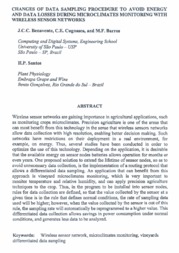Changes of data sampling procedure to avoid energy and data losses during microclimates monitoring with wireless sensor networks.
Changes of data sampling procedure to avoid energy and data losses during microclimates monitoring with wireless sensor networks.
Author(s): BENAVENTE, J. C. C.; CUGNASCA, C. E.; BARROS, M. F.; SANTOS, H. P. dos
Summary: Wireless sensor networks are gaining importance in agricultural applications, such as monitoring crops microclimates. Precision agriculture is one of the areas that can most benefit from this technology in the sense that wireless sensors networks allow data collection with high resolution, enabling better decision making. Such networks have restrictions on their deployment in a real environment, for example, on energy. Thus, several studies have been conducted in order to optimize the use of this technology. Depending on the application, it is desirable that the available energy on sensor nodes batteries allows operation for months or even years. One proposed solution to extend the lifetime of sensor nodes, so as to avoid unnecessary data collection, is the implementation of a routing protocol that allows a differentiated data sampling. An application that can benefit from this approach is vineyard microclimates monitoring, which is very important to monitor temperature and reIative humidity, and can apply precision agriculture techniques to the crop. Thus, in the program to be installed into sensor nodes, rules for data collection are defined, so that the value collected by the sensor at a given time is in the rule that defines normal conditions, the rate of sampling data used will be higher; however, when the value collected by the sensor is out ofthis rule, the sampling rate will automatically be reprogrammed to a higher value. This differentiated data collection allows savings in power consumption under normal conditions, and generates less data to be analyzed. Keywords: Wireless sensor network, microclimates monitoring, vineyards differentiated data sampling
Publication year: 2010
Types of publication: Paper in annals and proceedings
Unit: Embrapa Grape & Wine
Observation
Some of Embrapa's publications are published as ePub files. To read them, use or download one of the following free software options to your computer or mobile device. Android: Google Play Books; IOS: iBooks; Windows and Linux: Calibre.
Access other publications
Access the Agricultural Research Database (BDPA) to consult Embrapa's full library collection and records.
Visit Embrapa Bookstore to purchase books and other publications sold by Embrapa.

